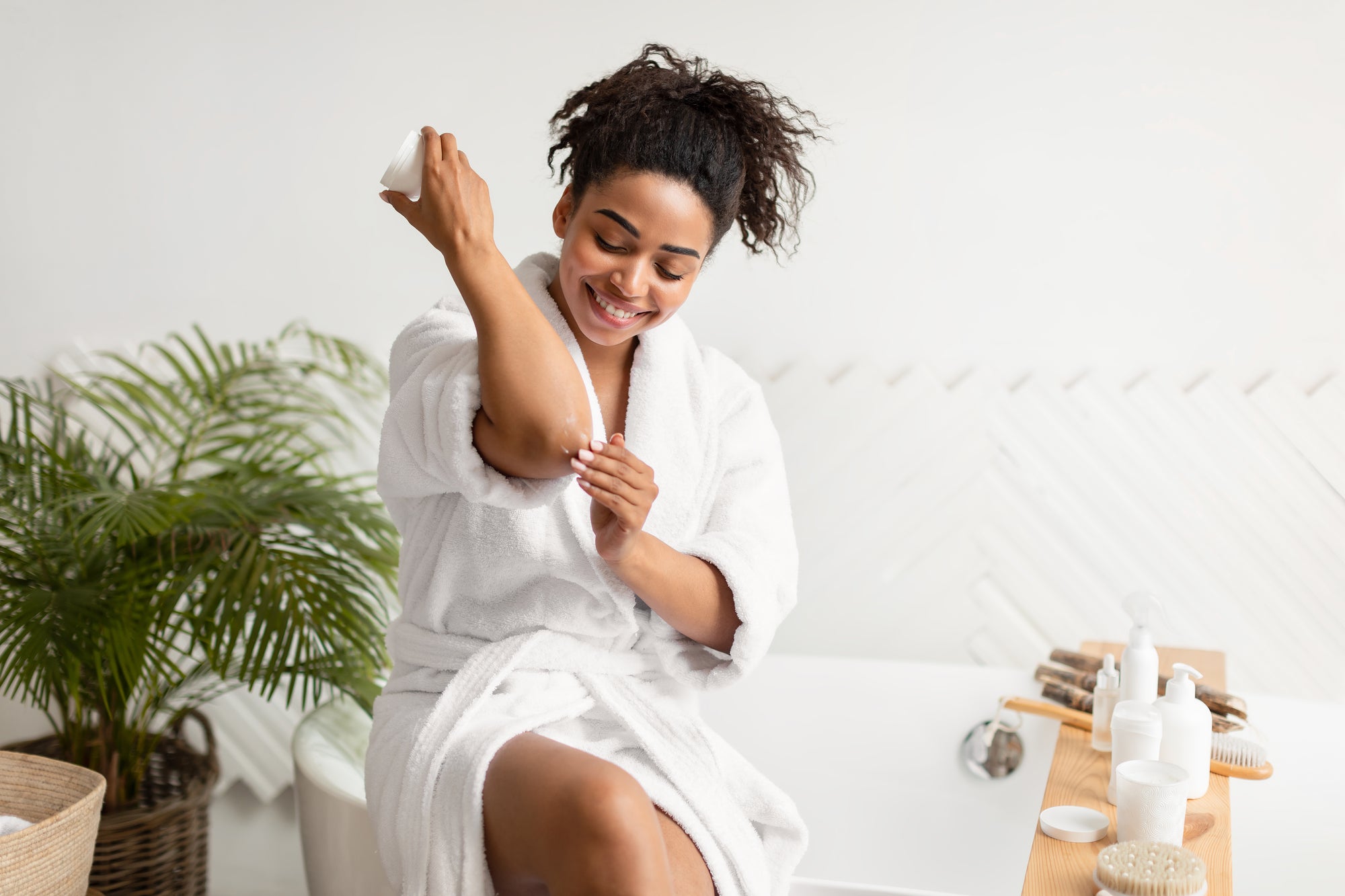

Psoriasis Skincare: A Guide to Nurturing and Nourishing Skin With Psoriasis
What is Psoriasis?
Psoriasis is a skin disorder that causes inflammation in the body, which often results in skin irritation and symptoms like red, itchy, scaly patches. These patches most commonly appear on the knees, elbows, scalp, and lower back, but can appear anywhere on the body. Most people with psoriasis only experience small inflamed patches of skin in certain areas, but these areas are often prone to itchiness, stinging, or burning. Psoriasis is a long-term (chronic) condition with no currently known cure.
What Causes Psoriasis?
While the exact cause of psoriasis is not certain, experts believe that psoriasis is an autoimmune disease (meaning that the immune system becomes overactive and attacks normal tissues within the body.) The overactive immune system triggers new skin cells to form too quickly. Normally skin cells are replaced around every 10 to 30 days, but with psoriasis new cells grow every 3 to 4 days. Rather than shedding old cells and replacing them with new ones, the skin cells pile up on the skin’s surface, creating those red, scaly patches. Psoriasis tends to run in families, but it can be known to skip generations.
What are Common Psoriasis Symptoms?
The symptoms and signs of psoriasis can differ depending on the person and type of psoriasis. Some common symptoms of psoriasis include:
- Red patches of skin with silvery scales (called plaques)
- Dry, cracked skin
- Itching, burning, stinging, or soreness
- Discolored, pitted, or ridged fingernails and toenails
- Scaly plaques/itchiness on the scalp
- Swollen or stiff joints (usually only found in those with a form of arthritis called psoriatic arthritis)
People with most types of psoriasis experience cycles, where flare-ups occur for several weeks or months and then subside (or even sometimes go completely into remission.)
What Can Trigger Psoriasis Flare-Ups?
Psoriasis flare ups can be triggered by a number of external factors, and these triggers can differ depending on the person. A few common triggers for flare-ups include:
- Stress
- Smoking
- Certain medications
- Heavy alcohol consumption
- Skin damage (like sunburns) or injury
- Weather or seasonal changes (cold weather has been known to trigger flare ups due to a lack of moisture in the air)
- Illness (strep infection, ear infection, bronchitis, tonsillitis, or respiratory infection, etc.)
What Can I Do to Soothe My Psoriasis Symptoms?
While there is no currently known cure for psoriasis, there are many effective methods that have been found to soothe symptoms during a flare up. In addition to seeking medical and dermatological treatment for psoriasis, these tips can help you keep your skin feeling nourished and hydrated:
Take Baths
Taking frequent baths can help soften and remove scales, as well as calm inflamed patches of skin. Adding ingredients to your bath like colloidal oatmeal (a kind of oatmeal that dissolves in your bath and won’t clog your drain), bath oil, and Epsom salts can also help give your skin a more soothing soak. When running your bath, make sure to use lukewarm water rather than hot water, as hot water can dry out your skin and worsen itchiness.
Get Some Sun
A controlled amount of sun exposure can help to improve psoriasis symptoms. The sun’s ultraviolet B (UVB) rays can help slow the rapid rate of skin cell formation and shedding. However, too much sun exposure can trigger flare-ups or worsen symptoms, so it's recommended that you limit your sun exposure to around 10 minutes at the start and gradually increase your exposure by 30 seconds each day. It’s also important to remember to apply sunscreen (with an SPF of at least 30) to all areas of skin that are not impacted by psoriasis.
Resist the Itch
Itching your psoriasis-affected areas may feel satisfying in the moment, but it can ultimately worsen plaques and increase the risk of infection. So, rather than giving into the urge to scratch, try soothing it using natural ingredients. We recommend seeking out products that contain natural ingredients, like honey or teatree to soothe your skin without risking further irritation.
Remove Scales Properly
Removing excess plaques and scales can bring comfort to your psoriasis-affected areas, but this must be done properly. Pulling off scales can increase flare-ups and result in permanent skin damage. There are a couple ways to properly remove scales. After a bath, you can gently remove scales with your fingers, tweezers, or a wet washcloth while skin is still damp. You can also remove scales by applying a salicylic acid topical ointment to soften affected areas. Once areas feel/appear softened you can gently cleanse them with lukewarm water to shed them off.
Keep Skin Moisturized with our Honeybutter Body Salve
A good moisturizer is essential to nourishing skin and soothing the effects of psoriasis. Keeping skin hydrated can reduce itchiness and irritation, on top of helping to prevent future flare-ups. It’s important to look for thick moisturizers that can lock in water and intensely hydrate the skin. In fact, our Honeybutter body salve was designed specifically to apply intense hydration to itchy, flaky, irritated skin. Not only does our Honeybutter act as a humectant, drawing moisture to the top layer of the skin for intense hydration, it also helps act as a barrier, locking in moisture and protecting against bacteria. Made with natural hydrating ingredients like organic manuka honey, aloe vera, and beeswax, Honeybutter is the perfect product to help you nourish, hydrate, and soothe psoriasis-affected skin.
Sources:
Mayo Clinic: Psoriasis | National Psoriasis Foundation: About Psoriasis | NHS: Psoriasis Overview | Centers for Disease Control and Prevention: What is Psoriasis? | WebMD: Psoriasis | Everyday Health: Psoriasis Symptoms and Complications | National Psoriasis Foundation: Causes and Triggers | WebMD: Home Remedies for Psoriasis | Healthline: Sun and Psoriasis - The Benefits and Risks | Medical News Today: Why Psoriasis Itches and How to Stop It | WebMD: Ways to Safely Remove Psoriasis Patches
